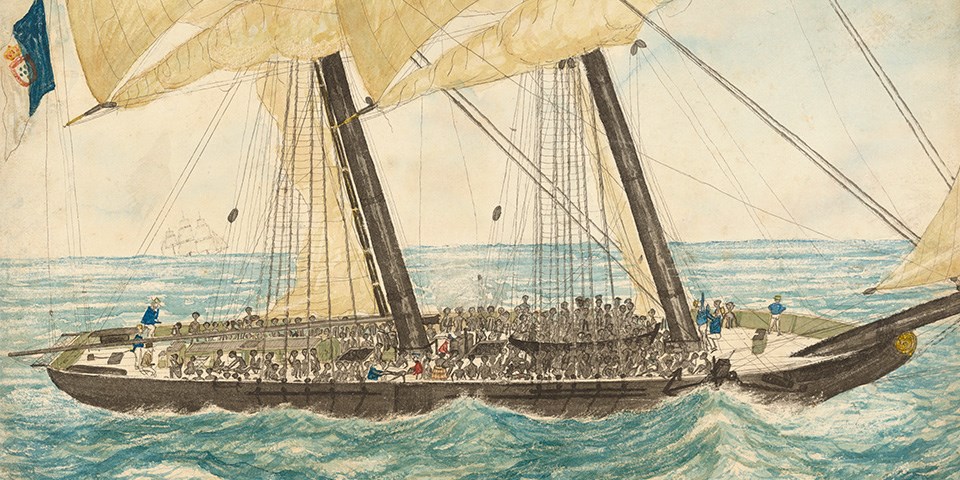Part of a series of articles titled The Constitutional Convention: A Day by Day Account for August 16 to 31, 1787.
Article
August 21, 1787: The Slave Trade

Collection of the Smithsonian National Museum of African American History and Culture, https://nmaahc.si.edu/object/nmaahc_2010.21.2ab?destination=/explore/collection/search%3Fedan_q%3Dslave%2520ship
"South Carolina can never receive the plan if it prohibits the slave-trade. In every proposed extension of the powers of Congress, that State has expressly and watchfully excepted that of meddling with the importation of negroes."
--Charles Pinckney
Tuesday, August 21, 1787: The Convention Today
Livingston (NJ) reported from the Grand Committee which had been charged with writing sections concerning federal power over the states’ militias and federal assumption of state debts. The committee had written that the federal government would have the power to pay off its own debts and those of the states and that the US Congress would “make laws for organizing, arming, and disciplining the militia, and for governing such part of them as may be employed in the service of the United States.”
Gerry (MA) opposed just giving the power to pay federal debts—he wanted the obligation to pay them recognized. He also resented that the federal assumption of state debts would benefit states which had done a poor job of paying their creditors, to the detriment of more fiscally responsible states. Further debate was unanimously put off.
Article 7, Section 3, proportioning direct taxation to the states’ populations, was passed 10–1, with Delaware opposed.
Luther Martin (MD) (who personally enslaved six people) now moved to allow Congress to tax and even prohibit the importation of enslaved Africans. He made three arguments:
- Since enslaved people partially counted toward how much representation states received in Congress, the slave trade was wrongly incentivized.
- The risk of slave rebellions weakened the United States.
- “It was inconsistent with the principles of the Revolution, and dishonorable to the American character, to have such a feature [the slave trade] in the Constitution.”
Rutledge (SC) (who enslaved dozens of people) hotly replied, “Religion and humanity had nothing to do with this question. Interest alone is the governing principle with nations. The true question at present is, whether the Southern States shall or shall not be parties to the Union.” He noted the enormous profit that northern shipping interests would make exporting goods created by enslaved labor.
Ellsworth (who had never enslaved anyone) agreed with Rutledge. “Let every State import what it pleases. The morality or wisdom of slavery are considerations belonging to the States themselves. What enriches a part enriches the whole, and the States are the best judges of their particular interest.”
Charles Pinckney (SC) (who enslaved over 100 people) suggested that “if the States be all left at liberty on this subject, South Carolina may perhaps, by degrees” eventually ban the slave trade.
On this note, the Convention adjourned.
- The Grand Committee submitted two new sections for the Convention’s consideration:
- The federal government would be empowered to pay both its own debts and the states’ debts.
- The US Congress could regulate the states’ militias.
- Congress was given the power to impose direct taxes in proportion to the states’ populations.
- Congress was not given the power to tax exports.
- A proposed ban on the importation of enslaved Africans again exposed an ugly division between the delegates over the ethics of enslavement.
- Gerry (MA) wrote his wife, Ann, that he would not support the Constitution: “I am as sick of being here as you can conceive, most of the Time I am at home or in convention... We meet now at ten and sit till four but entre nous I do not expect to give my voice to the measure.” He had been profoundly disturbed by the military powers given the federal government in the prior week.
- Brearly wrote from Philadelphia to Paterson, who was not currently at the Convention, begging him to return to New Jersey’s delegation: “Cannot you come down and assist us—we have many reasons for desiring this; our duty, in the manner we now sit, is quite hard for three, but a much stronger reason is, that we actually stand in need of your abilities.”
- John Fitch wrote Johnson (CT) to thank him for visiting his steamboat yesterday in company with several other delegates.
- Francis Childs wrote from New York to Franklin (PA) to apologize for not making the payment due Franklin at the end of August and to order more type from Franklin's type foundry.
- The day was cloudy, warm, and humid.
Last updated: September 22, 2023
